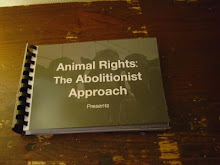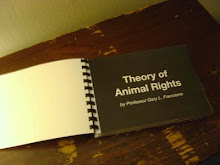LISTEN HERE
In part two of the interview we discuss single issue campaigns, in relation to the recent debate that Professor Francione took part in with Dario Ringach which was partly the inspiration of the blog essay:
Why Veganism Must Be the Baseline
which I recommend as a must read for all advocates.
We also discuss the latest Abolitionist Approach blog essay:
Nothing to Do with Science
in which the latest attempt at using the age old "plant question" is addressed.
Thank you, Professor Francione!
Thursday, March 24, 2011
Subscribe to:
Post Comments (Atom)












Gary said (referring to the audience in his debate with Prof. Ringach):
ReplyDelete"I was looking out at them and I thought, 'Most of these people aren't vegans...If you've got a bunch of people who think that inflicting death and suffering on animals, because they taste good, where there is no necessity whatsoever, then why aren't they gonna think that it's OK to use them in situations in which they believe – wrongly, in my view – but where they believe that necessity is an issue.'"
Due to this consideration, he then decided to modify his presentation.
While I completely agree with Gary's insight, I find it somewhat surprising that it occurred to him on the occasion of this particular event, in that I take it to be part of the foundation of the abolitionist approach. For many years, Gary has been pointing out that, as long as animals are on our plates, we will not be able to think clearly about the issue of animal exploitation. He has also said that eating animals (flesh, milk, eggs) is considered as normal and natural as breathing air and drinking water. Given that using animals in research is the least trivial form of animal use, nonvegans – all of whom can see nothing wrong with using animals for gustatory pleasure - simply cannot, no matter how hard they may try, make sense of the idea that using animals for the purpose of saving human lives is morally objectionable. To the extent to which nonvegans oppose vivisection, they do so on merely welfarist grounds, i.e., because it provides them with an alibi for remaining nonvegan.
Eating animals is the primary practice; it is both quantitatively and qualitatively different from all other forms of animal use in that all other forms are derivative[1]. That's why, in my view, campaigns focusing on any issue other than eating animals cannot have an abolitionist function. They can - regardless of the advocates' motives - only serve as a distraction from the primary issue. But this applies not only to campaigns run by welfarist organizations for fundraising purposes but to any form of public advocacy.
Gary said that he started his part in the debate discussing the primary practice. This may have caused a number of people to go vegan on the spot, but the majority of a nonvegan audience remains nonvegan and, thereby, unamenable to ethical arguments against vivisection. Moreover, such arguments fuel the perception of veganism as something not to be taken seriously – like, in Gary's car analogy, arguing against using a car for taking someone in need of medical help to a physician would – COULD – not be taken seriously by those who find nothing wrong with driving cars for fun.
From all of this, it follows, I think, that animal advocacy should abstain from not only campaigning against, but even publicly talking about, issues other than eating animals (flesh, milk, eggs). Limiting advocacy to opposition to the primary practice is the only viable way of fighting vivisection. No one who eats a vegan diet for ethical reason supports vivisection.
Best,
Karin Hilpisch
[1] "[A]ll animal use is derivative of the fact that we eat animals and animal products. If that changed, everything would follow." (Gary's blog,
"Is Every Campaign A Single-Issue-Campaign ?")
And: "The most significant form of animal exploitation --the form that 'legitimizes' all the others--involves using animals as food. If you dislodge that use, you dislodge all others." ("A Short Note on Abolitionist Veganism as a Single Issue Campaign")
Gary pointed out that while he disagrees with supporters of animal welfare reform (AWR hereafter), this does not mean that he thinks they are bad people. He addressed the "idea...that the people who work at these organizations know that they are doing wrong by promoting AWR but they are doing it anyway just to make money," and commented: ''Are there people like that? Yes, I suppose there are, but it's a lot more complicated. I think people talk themselves into things...A lot of these welfarist people are probably sincere and think that they are doing something good because they've talked themselves into it." Referring to Robert Garner, Peter Singer, HSUS, PETA, RSPCA, Gary noted: "Do I believe that the people who are arguing that with me believe in in good faith that AWR works? Yes." He emphasized that he thinks supporters of AWR "really believe on some level" in what they promote. The idea that people we disagree with...the idea that the other sits around and says, 'I'm evil, and I enjoy being evil', is cartoonish, it is simplistic, it is ridiculous."
ReplyDeleteI'm wondering who – which serious abolitionist – actually thinks, or has expressed the view, that our opponents are "evil"? Gary said, "Let's not get into judgments, let's get into analysis." But suggestions, whether approving or disapproving, concerning someone's motives ARE a judgment, and the concept of sincerity does not help us to understand the problem we are faced with here. A problem the nature of which Gary depicted when he stated that corporate welfarism is a business; in fact, it is, as he has pointed out elsewhere, a multi-billion dollar business. Gary: "Are a lot of those people involved in organizations that make a living or make money from promoting that idea? Yes. Do I think that being involved in one of those organizations facilitates your buying into the mythology that AWR is a good thing? Yes." Those who run these organizations and those who work for them have a vested interest in keeping the business running safely, efficiently, and profitably, to borrow a phrase from slaughterhouse designer Temple Grandin. They have financial obligations which make them utterly dependent on the income they receive from "packaging and selling single-issue campaigns to the public" (Gary). Those who buy this ''activism'' are members and donors who are not vegans and who want to continue to consume animals. And they want to feel OK about it. Welfarist animal advocacy makes the them feel good / better about consuming animals; they encourage the consumption of animals while claiming to pursue a reduction, or even the abolition, of the use of animals for food (and for other purposes).
An individual or group that is not independent of the support of those whose interests are in opposition to the avowed goal of its policy stands in a manifest conflict of interest which the person or group attempts to obscure by identifying their interests with animals' interests. This identification constitutes a self-serving rationalization and, to the extent to which they "talk themselves into it," a grotesque self-delusion. In any event, a conflict of interest, such as is evident in corporate welfarism, deprives animal advocates' defence of their policy of the authority needed for it to be deemed worthy of serious consideration. That is, welfarists' "arguments" are in need not of being rebutted so much as exposed.
(cont.)
(cont.)
ReplyDeleteThose who make money – a living or a fortune – from making the public feel better about consuming animals may or may not sincerely believe in what they say they believe in; they simply cannot 'afford' to be convinced by the better argument that speaks against AWR. They will buy into, and promote, whatever ideology serves to provide a justification for their campaigns. Where business rules, belief is irrelevant. What is Wayne Pacelle paid $300,000 per year for? Welfarist functionaries – in particular CEOs and presidents – are paid whatever it takes to buy their complicity and compliance.
It's the structural conditions under which corporate welfarists act, and the role which their ideology plays in obscuring these conditions, that those who support these organizations in good faith need to be educated about.
Gary said, "We're never going to win it on the health issue." I agree completely. People go vegan when they are moved to see that we owe it to animals to be vegan. Why, then, talk about health at all? The moral effect is not only not strengthened, it is undermined, when we "supplement" the moral point by telling people that their arteries get clogged with animal fat or that eating animals makes them more prone to suffering a stroke.
ReplyDeleteGary pointed out repeatedly that single-issue campaigns (SICs) don't work because they can't work; he thinks SICs are problematic and he would not spend time doing them. But he also said: "To the extent that you do, it is imperative that you make your SIC include veganism." Such a campaign should "incorporate veganism as an explicit part".
It is my understanding that SICs are defined as constituting the opposite of a vegan campaign. Either an anti-fur campaign, for example, incorporates explicit opposition to consuming dairy, eggs, and meat, and then it is not single-issue; or it does not, and then it is not a vegan campaign. Hence, there can be no vegan SIC.
The fact that corporate welfarists use SICs as fundraising vehicles is, I think, a sufficient reason for rejecting them unequivocally and for not leaving any "loopholes". In any case, what applies to campaigns, applies all the same to all other forms of public advocacy. Gary said that SICs are intended to make, and have the effect of making, it seem that certain forms of animal exploitation are worse than others, or reversely, that certain forms are OK. Whether an advocate intends to sell indulgences for absolving people from going vegan, or not, his or her single-issue activism has the same effect on people: it makes them feel more comfortable about not being vegan. This being so, it makes but little difference, from a practical perspective, whether (or not) someone is well-intentioned in their advocacy.
To anyone interested in analysis, discussions about intention, motive, and sincerity are unhelpful because in the wrong dimension. Indeed, such discussions are not the radical negation of unsavory moralism so much as its faithful reverse image. The way to negate moralism is not to assert that everyone is sincere and well-intentioned (even Colonel Gaddafi): it is simply to analyze whether or to what extent the structural conditions under which people act are credibly consistent with the goal they claim to pursue – in this case, abolition.
Thanks for the great Gary interviews, Elizabeth! (:
ReplyDelete